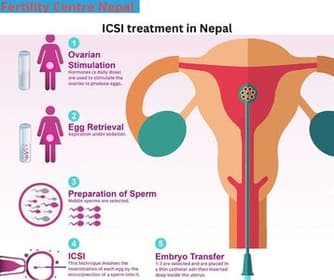What is the ICSI treatment in Nepal & how is it performed?

ICSI is an advanced IVF valuable procedure in treating severe cases of male infertility issues. ICSI in Nepal is a procedure in which a fertility expert injects a single sperm directly into each egg. It is a parallel procedure to conventional IVF where after suitable stimulation, the experts retrieve the woman's eggs & combine them with the birth father's or donor's sperm. ICSI in Nepal is performed in five steps that help couples to conceive a baby & these are:
- Sperm retrieval: It is the first step of ICSI treatment in Nepal in which the male partner must produce his sperm sample into a cup, or if sperms are unavailable in his ejaculate, experts extract the sperm surgically. In some cases, fertility expert performs sperm retrieval procedure earlier & freeze the sperm in an incubator. After this, the fertility expert retrieves multiple eggs from the woman's ovaries using a fine needle & ultrasound probe. It is not a painful procedure; however, some women experience slight cramping, which will reduce by taking painkillers.
- Sperm injection into egg: After the retrieval process, the expert will wash the male member's semen sample & isolate a single sperm. The fertility professional directly injects the isolated single active sperm into each egg using a fine hollow needle. The sperm must directly inject so it can swim through the cervical fluid. The sperm takes around 24 hours to fertilize an egg & become an embryo.
- Embryo monitoring: The fertility professional put the fertilized embryo/s in the IVF laboratory for about six days. During this period, the fertility expert monitors the growth & development of the embryo/s.
- Embryo transfer: On the day of embryo transfer, the trained embryologist picks the most active embryo/s & implants it into the birth mother's uterus to establish a successful conception.
- Pregnancy test: Once the embryo gets transferred, the couple must visit the fertility clinic after two weeks of embryo transfer for the pregnancy test. The fertility expert conduct ultrasound to check the pregnancy status by listening to the infant's heartbeat. If an infant's heartbeats are normal, it indicates a successful conception has occurred & couples get discharged from the fertility clinic to their local gynaecologist for further treatment. Suppose the first attempt at ICSI treatment in Nepal was unsuccessful. The couple can repeat the procedure to achieve successful results.
What's the ICSI treatment success rate in Nepal for a couple seeking fertility treatments?
The ICSI treatment success rate in Nepal for couples seeking fertility treatments to conceive a baby is around 75 to 85% for couples below the age of 35; however, these success rates dip down to 45 to 55% for couples above 35. After age 35, women's ovarian reserve starts falling & men also face difficulties producing enough sperm for fertilization. The fertility professionals at Fertility Centre Nepal suggest couples plan their fertility treatment according to their age. If couples try 2 to 3 standard IVF cycles & still do not achieve successful results, they should undergo advanced fertility procedures to achieve the highest results of conception. However, the couple should speak to the fertility expert because they are the ones who examine the couple again & suggest the best-advanced IVF procedures.
Who are eligible for ICSI in Nepal?
ICSI treatment in Nepal is the best procedure for male members dealing with the following conditions. These are:
- Azoospermia
- Inadequate quality of sperm
- Low or lack of sperm counts
- Inadequate motility or sperm movement
- Sperm that cannot infiltrate an egg
Read more: https://fertilitycentrenepal.com/icsi/